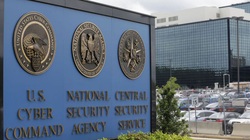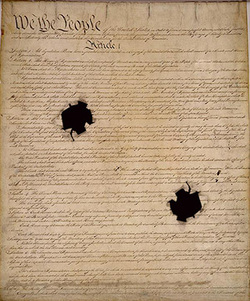
The House on Thursday passed legislation to end the National Security Agency's bulk collection of American phone records, the first legislative response to the disclosures by former NSA contractor Edward Snowden. Although the compromise measure was significantly "watered down," in the words of Democrat Jan Schakowsky of Illinois, it passed by a vote of 303 to 120, with 9 members not voting.
"We must not let the perfect be the enemy of the good," Schakowsky, an intelligence committee member, said in summing up the feelings of many Republicans and Democrats who voted for the measure but wanted tougher provisions. Dropped from the bill was a requirement for an independent public advocate on the secret intelligence court that oversees the NSA.
The USA Freedom Act would codify a proposal made in January by President Barack Obama, who said he wanted to end the NSA's practice of collecting the "to and from" records of nearly every American landline telephone call under a program that searched the data for connections to terrorist plots abroad.
The bill instructs the phone companies to hold the records for 18 months--which they already were doing-- and lets the NSA search them in terrorism investigations in response to a judicial order. The phone program was revealed last year by Snowden, who used his job as a computer network administrator to remove tens of thousands of secret documents from an NSA facility in Hawaii.
The measure now heads to the Senate. Sen. Dianne Feinstein, D-Calif., the chairwoman of the intelligence committee, has said she is willing to go along with a similar idea.
NSA officials were pleased with the bill because under the existing program, they did not have access to many mobile phone records. Under the new arrangement, they will, officials say.
"I believe this is a workable compromise that protects the core function of a counter terrorism program we know has saved lives around the world," said Rep. Mike Rogers, R-Mich., the House Intelligence Committee chairman.
Privacy and civil liberties activists denounced the measure, saying it had been "gutted" to win agreement from lawmakers such as Rogers who supported the NSA phone records program.
"This legislation was designed to prohibit bulk collection, but has been made so weak that it fails to adequately protect against mass, untargeted collection of Americans' private information," Nuala O'Connor, president and CEO of the Center for Democracy and Technology, said in a statement.
Technology companies such as Google and Facebook also withdrew their support, saying they were concerned about language they fear could allow bulk collection of Internet data. Proponents say that concern is misplaced.
"Those who say this bill will legalize bulk collection are wrong," said Rep. C. A. "Dutch" Ruppersberger, the ranking Democrat on the Intelligence Committee. "They are trying to scare you by making you think there are monsters under the bed."
The White House endorsed the measure.
"The bill's significant reforms would provide the public greater confidence in our programs and the checks and balances in the system," the Office of Management and Budget said in a statement Wednesday.
House Intelligence Committee member Rep. Adam Schiff, D-Calif., said the bill is perhaps the most significant action Congress will take in response to the Snowden leaks. The former NSA contractor handed journalists documents that revealed a host of once-secret NSA surveillance programs, including some that sweep in the personal information of Americans even as they target foreigners.
Outrage over the programs that Snowden publicized brought together conservatives and liberals who favor civil liberties, while the administration and congressional leadership resisted changing what they considered a useful counterterror tool.
"I think there's been remarkable convergence on the issue," Schiff said. "It wasn't long ago that it was a real struggle with the idea of ending bulk collection. I think it's a very good bill."
Schiff said he wished the bill had provided for an independent public advocate on the Foreign Intelligence Surveillance Court, the secret judicial body that sets the legal parameters for NSA surveillance that touches on Americans. Such an advocate could challenge the government's legal positions on what surveillance is permissible, he said. As it stands, the FISA court only hears from the government. No one represents the American public, whose data is being collected, or the terror suspect in court.
Instead, the law includes "a fairly weak" provision for friend of the court briefs, which are already allowed under existing law.
"I don't think it's the end of the reform process," Schiff said.
In another change, the original bill required annual public reports by the government estimating, to the nearest 100, how many Americans were subject to various categories of secret intelligence surveillance, according to OpentheGovernment, a coalition promoting government transparency.
Those requirements were dropped from the bill, the group said.
"We must not let the perfect be the enemy of the good," Schakowsky, an intelligence committee member, said in summing up the feelings of many Republicans and Democrats who voted for the measure but wanted tougher provisions. Dropped from the bill was a requirement for an independent public advocate on the secret intelligence court that oversees the NSA.
The USA Freedom Act would codify a proposal made in January by President Barack Obama, who said he wanted to end the NSA's practice of collecting the "to and from" records of nearly every American landline telephone call under a program that searched the data for connections to terrorist plots abroad.
The bill instructs the phone companies to hold the records for 18 months--which they already were doing-- and lets the NSA search them in terrorism investigations in response to a judicial order. The phone program was revealed last year by Snowden, who used his job as a computer network administrator to remove tens of thousands of secret documents from an NSA facility in Hawaii.
The measure now heads to the Senate. Sen. Dianne Feinstein, D-Calif., the chairwoman of the intelligence committee, has said she is willing to go along with a similar idea.
NSA officials were pleased with the bill because under the existing program, they did not have access to many mobile phone records. Under the new arrangement, they will, officials say.
"I believe this is a workable compromise that protects the core function of a counter terrorism program we know has saved lives around the world," said Rep. Mike Rogers, R-Mich., the House Intelligence Committee chairman.
Privacy and civil liberties activists denounced the measure, saying it had been "gutted" to win agreement from lawmakers such as Rogers who supported the NSA phone records program.
"This legislation was designed to prohibit bulk collection, but has been made so weak that it fails to adequately protect against mass, untargeted collection of Americans' private information," Nuala O'Connor, president and CEO of the Center for Democracy and Technology, said in a statement.
Technology companies such as Google and Facebook also withdrew their support, saying they were concerned about language they fear could allow bulk collection of Internet data. Proponents say that concern is misplaced.
"Those who say this bill will legalize bulk collection are wrong," said Rep. C. A. "Dutch" Ruppersberger, the ranking Democrat on the Intelligence Committee. "They are trying to scare you by making you think there are monsters under the bed."
The White House endorsed the measure.
"The bill's significant reforms would provide the public greater confidence in our programs and the checks and balances in the system," the Office of Management and Budget said in a statement Wednesday.
House Intelligence Committee member Rep. Adam Schiff, D-Calif., said the bill is perhaps the most significant action Congress will take in response to the Snowden leaks. The former NSA contractor handed journalists documents that revealed a host of once-secret NSA surveillance programs, including some that sweep in the personal information of Americans even as they target foreigners.
Outrage over the programs that Snowden publicized brought together conservatives and liberals who favor civil liberties, while the administration and congressional leadership resisted changing what they considered a useful counterterror tool.
"I think there's been remarkable convergence on the issue," Schiff said. "It wasn't long ago that it was a real struggle with the idea of ending bulk collection. I think it's a very good bill."
Schiff said he wished the bill had provided for an independent public advocate on the Foreign Intelligence Surveillance Court, the secret judicial body that sets the legal parameters for NSA surveillance that touches on Americans. Such an advocate could challenge the government's legal positions on what surveillance is permissible, he said. As it stands, the FISA court only hears from the government. No one represents the American public, whose data is being collected, or the terror suspect in court.
Instead, the law includes "a fairly weak" provision for friend of the court briefs, which are already allowed under existing law.
"I don't think it's the end of the reform process," Schiff said.
In another change, the original bill required annual public reports by the government estimating, to the nearest 100, how many Americans were subject to various categories of secret intelligence surveillance, according to OpentheGovernment, a coalition promoting government transparency.
Those requirements were dropped from the bill, the group said.

 RSS Feed
RSS Feed